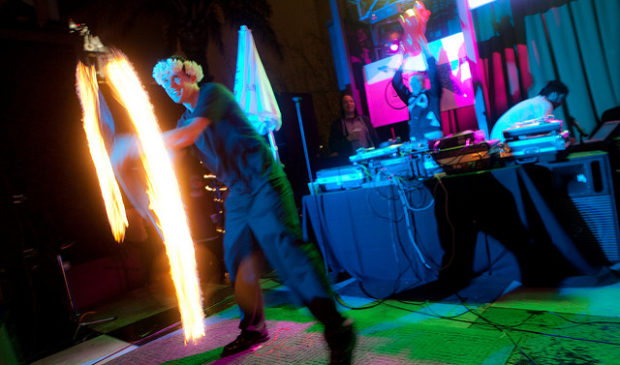City exploring solutions for creative spaces crisis
Friday, February 16, 2018 by
Chad Swiatecki The city is looking at a variety of strategies for assisting creative businesses and nonprofit organizations that are increasingly being priced out of theaters and other spaces due to Austin’s fast-rising cost of living. At its Thursday meeting, City Council unanimously passed a resolution that directs city staff to research five economic development and policy tools that could make the real estate environment more favorable for arts groups and increase revenues for working artists.
The resolution calls for the city manager to determine the steps involved in creating a “cultural trust” that would provide property for creative use, work with the Economic Development Department to identify incentives to provide space for cultural and arts uses in mixed-use developments, create a microloan program to promote the purchase of Austin-made art, expand the use of microloans to assist arts groups with expenses related to their spaces, and identify portions of CodeNEXT that could be used to encourage creation of arts spaces in high-population corridors.
A report on those initiatives is due to Council by March 22.
Council Member Ann Kitchen sponsored the resolution as a move to address the growing dilemma of arts groups that have been forced from their longtime homes in the past two years. In addition to the much-discussed plight of the Salvage Vanguard and Rude Mechs theater groups being forced to find new spaces, news came down last week that Flatbed Press & Gallery is being forced out of its 18,000-square-foot space by next February.
“This resolution … takes some steps toward studying some proposed solutions,” Kitchen said. “It’s about taking some action on creative spaces. We have opportunities with the revisions that we’re making to our economic development program. We have opportunities with regard to CodeNEXT to incentivize arts spaces, and we have opportunities with the pilot rental program that we did last year. This is about taking action, and we recognize how critical and how urgent it is that as a city we do what we can to preserve arts spaces.”
Speakers during public comment shared stories of the difficulty theater, dance and other disciplines are facing trying to stay in operation while looking for new spaces at rents they find hard to afford.
“It is terrifying, the idea that I cannot do my work, … cannot practice my craft,” said Florinda Bryant, an artistic director and educator with Salvage Vanguard. “This is my job, and I can’t do that because I can’t afford space. The city has been very generous with programs, but we would really be appreciative of an opportunity to fish for ourselves.”
Some of the possible solutions included in the resolution dovetail with other efforts moving through City Hall, most notably the coming revision to the city’s Chapter 380 agreements that provide economic incentives for businesses located in Austin. To date, those incentives have been a one-size-fits-all tool aimed at attracting large corporate campuses and hundreds of high-paying jobs, but last year Council directed the Economic Development Department to add tools that would grow small businesses, including those in the creative sector.
Before voting in favor, Mayor Pro Tem Kathie Tovo said her only concern with the resolution came from the possibility that the land trust may interfere with or duplicate services that are intended for a proposed city economic development corporation. A staff update on that effort is expected to be discussed at Council’s Feb. 27 work session.
John Riedie, chief executive officer of Austin Creative Alliance, said the resolution will help the city to align resources to gradually improve the state of the city’s creative class.
“There are things that can be done to close the gap, so when a group finds out they have so many days to come up with the money for a rent increase or modifications … I hope the report comes back that there can be some gap financing to help keep them in place,” he said. “It’s a question of what role can the city play in closing those gaps, and with this, we’re starting to look at it.”
Photo by kris krüg made available through a Creative Commons license.
The Austin Monitor’s work is made possible by donations from the community. Though our reporting covers donors from time to time, we are careful to keep business and editorial efforts separate while maintaining transparency. A complete list of donors is available here, and our code of ethics is explained here.
You're a community leader
And we’re honored you look to us for serious, in-depth news. You know a strong community needs local and dedicated watchdog reporting. We’re here for you and that won’t change. Now will you take the powerful next step and support our nonprofit news organization?






